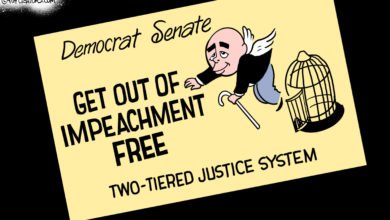The EU withdrawal fantasy
 British Prime Minister David Cameron is under enormous pressure from the small, but vocal eurosceptic wing of his own party, which demands that he hold a referendum on Britain’s continued membership in the European Union before the next general election, which must be held by May 2015. Cameron has already pledged to do so after the next general election, if the Conservatives win it, but eurosceptics demand a referendum now. And they believe they’d win it.
British Prime Minister David Cameron is under enormous pressure from the small, but vocal eurosceptic wing of his own party, which demands that he hold a referendum on Britain’s continued membership in the European Union before the next general election, which must be held by May 2015. Cameron has already pledged to do so after the next general election, if the Conservatives win it, but eurosceptics demand a referendum now. And they believe they’d win it.
Why do they (and a large part of the British electorate) want Britain to leave the EU? Because of their own utter ignorance and fantasies about how supposedly well-off Britain would be if she were to just leave the EU. Some Eurosceptic Conservatives probably don’t really believe in such fantasies but are deadly afraid of the UK Independence Party (UKIP), which is siphoning voters away from the Conservative Party.
But both assumptions are wrong. Britain would, in fact, be much worse off if she left the EU, and promising to do so will not bring many UKIP voters back into the fold.
Norway and Switzerland: halfway in the EU but with no voice in it
British Eurosceptics love to point to Norway and Switzerland when conjuring up fantasies of how Britain would supposedly be better off if she just left the EU and have nothing but a free trade agreement with it… just like Norway and Switzerland.
The problem is that 1) Britain would be much worse off, and 2) Norway and Switzerland are far more tightly integrated with the EU than British Eurosceptics admit – but without having any voice in it.
Norway is a part of the Schengen passport-free travel zone and a part of the European Economic Area. It has almost unfettered access into the EU’s Single Market (AKA Common Market). But this “half-membership” comes at a heavy price: Norway has to accept about 90% of the laws and regulations adopted by the EU – virtually all of them except those pertaining to agriculture, fisheries, and some justice and immigration affairs. But it has to accept ALL other EU laws and regulations – including the social and employment policies so hated in Britain, including the 48 work week.
Basically, if an EU law/regulation is not about agriculture, fisheries, justice, or immigration, Norway has to obey it – without having any voice whatsoever in its shaping.
Moreover, Norway doesn’t even have unfettered access to the EU’s Single Marker (hence I used the word “almost”). Since it’s not a member, Norwegian businesses shipping goods into or out of the EU have to comply all the customs and VAT forms that non-European countries have to. For big businesses, this isn’t much of a problem. For small and mid-sized businesses, it’s a nightmare. To cope with that, many Norwegian businesses set up subsidiaries in an EU member state that complete these forms for them and thus provide them with access to the EU’s Single Market.
But this is costly – Norwegian businesses would be better off if they didn’t have to set up such subsidiaries at all… but that would be the case only if Norway fully joined the EU.
Moreover, Norwegian officials, lobbyists, and businesses are not even informed about what’s going on in European institutions and what are their discussions and plans – unless colleagues from an EU member state (usually Britain or a Scandinavian state) tell them. And Norway has no way to stop any EU laws/regulations it doesn’t like. To do that, it relies on… Britain, an EU member state, i.e. one with a seat at the table.
And Norway does have to contribute to the EU budget – it is, in fact, its 10th largest contributor, and pays more into the EU budget (per capita) than Britain does. But again, unlike Britain, it doesn’t have any say in how much money is required by the EU or what it’s spent on, because it doesn’t have a seat at the table. Britain does, being an EU member.
In fact, at the last EU summit, Britain was able to effect something that has never been done before in EU history (or in Washington, DC, pre-sequestration): cutting spending. It has also preserved its rebate. But that was possible only because Britain, being an EU member, has a seat at the table and a veto.
But were Britain to withdrew, she would STILL have to contribute to the EU’s budget – proportionally to its economy, that would be at least 2 bn EUR per year – but without having ANY say in how much it has to pay or what the money will be spent on.
In short, Britain would STILL have to comply with almost ALL regulations issued by the EU – but without any influence on them – and pay at least 2 bn euros per year for the privilege – again, without any say about it.
Is this what the British people really want?
Some will say “OK, maybe Norway’s arrangement is not what we should seek. Let’s go the Swiss way, then.”
But Switzerland is also closely integrated with the EU – far closer than British Eurosceptics acknowledge.
Switzerland joined the European customs’ union in 1972, abolishing its tariff and subsidy barriers. It has also joined the Schengen zone. It has full access to the EU’s Single Market in goods, but this comes at a price: accepting, as in Norway’s case, all EU laws and regulations pertinent to that market. And it only has partial access to the Single Market in services and capital, because it hasn’t yet accepted all of the EU’s relevant laws and regulations on the matter. It will have full access only once it accepts these in full – and Swiss companies are now lobbying the Swiss government to do so. If they fail, they won’t have access to the world’s largest single market, where they could offer their services (especially financial services in the post-crash EU).
But obtaining full access will mean adopting all of the EU’s relevant laws and regs. No ifs, buts, or ands.
Overall, Switzerland already has to comply with 80% of the laws and regulations the EU issues and is a member of its customs union as well as the Schengen zone. Had it not done so, it would’ve stagnated economically, being surrounded on all sides by the EU.
But, like Norway, Switzerland has no say in the matter. It has no influence whatsoever on the laws/regulations it must comply with. To fight the more onerous ones, it relies on an informal ally who also has a large financial sector: Britain.
But if Britain withdrew from the EU, Switzerland would lose its only ally in it, and the regulations would only get more onerous – with both Britain and Helvetia being forced to comply but with no say in the matter.
More information can be found here and here.
Now, why do Norway and Switzerland have to comply with all these regs, and why would Britain have to do the same were she to withdraw from the EU but still want access to the Single Market?
Because for a Single Market to exist, there must be a single set of regulations – not 27 different national ones – and someone to enforce these common rules. And Britain would slump into a deep recession if she were not to retain access to the Single Market.
So Norway and Switzerland have to comply with all the relevant EU regulations as a price of having access to the Single Market.
In fact, were Britain to withdraw from the EU, she would then be in the position of a begging supplicant, asking to be granted access to it. You can bet your life that EU members would demand a high price for such a concession. Eurosceptics’ idea that Britain’s European partners would give Britain something for nothing is a childish fantasy.
In short, withdrawal from the EU would have very few benefits to Britain. Its budgetary contributions would be reduced slightly, and it would no longer be bound by the EU’s common agricultural and fisheries policy. But it would still be bound by ALL other EU policies, laws, and regulations – those on the books now, and any that Brussels issues in the future. And it would have to pay at least 2 bn EUR per year for the privilege.
I’m absolutely confident that British MPs and most British voters would quickly dump notions of withdrawing from the European Union as soon as they heard of these facts.
Now, what about UKIP?
Some scared Tories believe that their party must support withdrawal from the EU to bring UKIP voters back into the Conservative fold.
Leaving aside the fact that it would be suicidal and unpatriotic to ruin the British economy just to appease some voters, the fact is, offering such policy would utterly fail. UKIP’s pledge to withdraw Britain from the EU if it wins power is not what draws most of its supporters to the party.
As extensive polling by Conservative peer Lord Ashcroft has shown, the vast majority of UKIP voters – all but the diehard Eurosceptics – don’t care deeply about Britain’s relationship with the EU and support UKIP for totally different, and closely related, reasons.
Firstly, they are worried about issues like immigration, the budget deficit, the debt, unemployment, sluggish economic growth, education, and political correctness. And UKIP, with its single unifying theory of what is wrong and how to put it right, offers an intellectually lazy, but simple and attractive solution that appeals to many people (even though it is dead wrong).
Secondly, many Britons believe that on the above issues, the three biggest parties don’t listen to ordinary people, while UKIP does.
Thirdly, most UKIP voters know, and would openly admit, that UKIP doesn’t stand a chance of ever winning power and that they vote for it simply as a protest. They furthermore say that UKIP, not being electable, can afford to say what it really thinks and not be called on it. And they like that.
This is certainly an appealing trait. And since UKIP has never been in power, it’s the last party on the right side of the British political spectrum that nobody can feel disappointed by. But this is also a tacit acknowledgment that UKIP can never, ever win power and deliver on its promises. Its single unifying theory and its prescriptions can never be verified. UKIP cannot deliver on its promises. Yet, for many Britons, that is not a weakness or a flaw: it’s a part of UKIP’s appeal.
In that sense, UKIP is like the other xenophobic, Eurosceptic British party, the British National Party, and like France’s National Front and far left parties. They will never win power and deliver on their promises. But that also means they can say whatever they want and never have to answer for it.
In any case, UKIP’s appeal has little, if anything, to do with the EU. Conservatives should not delude themselves otherwise. Remedies based on the wrong diagnosis will do far more harm than good.




